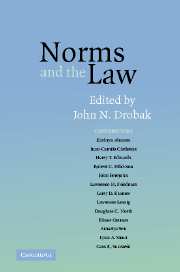Book contents
- Frontmatter
- Contents
- List of Contributors
- Acknowledgments
- Introduction
- PART ONE RATIONALITY AND NORMS
- 1 Social Norms and Other-Regarding Preferences
- 2 Damages, Norms, and Punishment
- 3 Cognitive Science and the Study of the “Rules of the Game” in a World of Uncertainty
- PART TWO NORMS OF THE COMMONS
- PART THREE JUDICIAL NORMS
- PART FOUR THE INFLUENCE OF LAW ON NORMS
- References
- Index
1 - Social Norms and Other-Regarding Preferences
Published online by Cambridge University Press: 05 June 2012
- Frontmatter
- Contents
- List of Contributors
- Acknowledgments
- Introduction
- PART ONE RATIONALITY AND NORMS
- 1 Social Norms and Other-Regarding Preferences
- 2 Damages, Norms, and Punishment
- 3 Cognitive Science and the Study of the “Rules of the Game” in a World of Uncertainty
- PART TWO NORMS OF THE COMMONS
- PART THREE JUDICIAL NORMS
- PART FOUR THE INFLUENCE OF LAW ON NORMS
- References
- Index
Summary
Several months ago I returned home from an out-of-town business trip. By the time the taxi made the trip from the airport to my house it was dark. The driver told me the fare was $16, and I fumbled in my wallet and pulled out what I thought was a $20 bill. I gave the bill to the driver and told him to keep the change. There came a moment of silence. Then the driver said, “You just gave me a $50 bill.”
In the early 1980s, when I was taking graduate level courses in economics and in law, my instructors taught me that events like this generally did not occur, and if they did, I ought not pay attention because such behavior was uncommon and unpredictable. Instead, I was taught that the best way to model human behavior was to assume that people always behaved like homo economicus – that they were both perfectly rational and perfectly selfish creatures. Both I and my instructors knew, of course, that real people did not always behave this way. But departures from rational selfishness were presumed to be rare, capricious, and not worth trying to consider.
Times change, and these days even scholars who are sympathetic to rational choice – I fit myself into that category – have begun to question the wisdom of always assuming that people behave in a rational and selfish manner. This trend is especially obvious in the legal literature.
- Type
- Chapter
- Information
- Norms and the Law , pp. 13 - 34Publisher: Cambridge University PressPrint publication year: 2006
- 9
- Cited by



